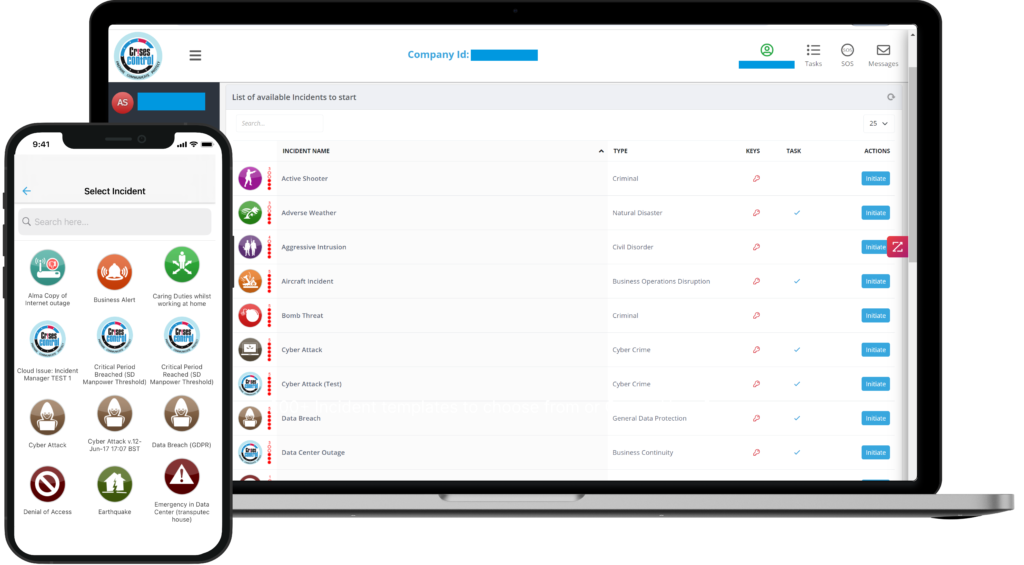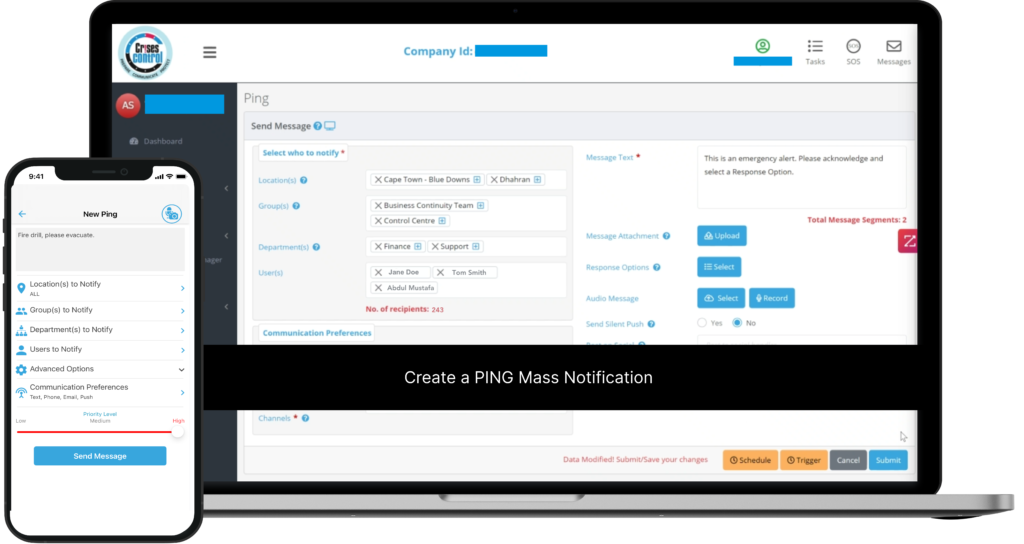Written by Anneri Fourie | Marketing Executive
Crises are an inevitable part of running a business. Whether it’s a cyberattack, supply chain disruption, or a natural disaster, being unprepared can have serious consequences. The way your organisation responds to a crisis can determine how quickly operations recover—or how deeply the damage spreads.
A centralised crisis management plan can transform how your business handles emergencies. It ensures all teams are aligned, communication is clear, and decisions are made quickly. Let’s explore five compelling reasons why this approach is essential, along with how Crises Control provides the tools to make it happen.
What Is a Centralised Crisis Management Plan?
A centralised crisis management plan integrates all policies, processes, and tools into one unified system for handling emergencies. Instead of different teams or departments managing crises independently, a centralised approach ensures everyone follows the same framework.
Key features include:
- A clear chain of command.
- Unified communication channels.
- Shared access to critical resources and information.
- A coordinated approach across departments.
This unified strategy leads to faster, more effective responses that minimise disruptions and help your business recover quickly. Now, let’s look at the five key reasons why your business needs a centralised crisis management plan.
Reason 1: Consistent and Reliable Crisis Responses
The Problem
When teams work in silos during a crisis, confusion is almost inevitable. Departments may send out conflicting messages or duplicate efforts, causing delays and potentially escalating the situation.
The Solution
A centralised crisis management plan eliminates this confusion by providing clear guidelines for every scenario. Everyone knows their role, and all actions are aligned with a single strategy.
How Crises Control Helps
Crises Control’s Incident Manager module ensures consistency by enabling you to predefine workflows. Teams can follow step-by-step instructions tailored to different types of emergencies, reducing errors and saving time. Automated alerts and task assignments keep everyone aligned, ensuring a smooth response.

Interested in our Incident Management Software?
Customise your Crisis Incident Management Software to meet your specific needs with our flexible tools & stay connected and informed during the crisis and incident management process
Reason 2: Improved Communication Across All Levels
The Problem
During a crisis, communication is everything. But fragmented systems can delay the flow of information, leaving critical updates unheard or misunderstood. This is especially challenging for organisations spread across multiple locations or with remote teams.
The Solution
A centralised plan relies on integrated communication tools to deliver accurate, real-time information to everyone involved. Whether it’s notifying employees, updating stakeholders, or sharing instructions, a unified system ensures no one is left in the dark.
How Crises Control Helps
With Crises Control’s Ping Mass Notification system, you can instantly send alerts via SMS, email, push notifications, and voice calls. This guarantees that important updates reach the right people, no matter where they are. You can even customise messages based on roles or locations to provide relevant information.
Reason 3: Faster and Smarter Decision-Making
The Problem
Time is critical during a crisis. In a decentralised setup, decision-making can be slow and disorganised, as information trickles in from various sources and approval processes create bottlenecks.
The Solution
Centralising your crisis management strategy allows leaders to access real-time data and make informed decisions quickly. With all critical information in one place, teams can act with confidence and precision.
How Crises Control Helps
Crises Control’s interactive dashboard offers a real-time overview of incidents, team statuses, and resource availability. This enables leaders to assess the situation at a glance and take swift action. Advanced reporting features provide insights that help refine decision-making over time.
Interested in our Ping Mass Notification System?
Efficiently alert everyone in seconds at scale with our Mass Notification System – PING, get the message out fast and ensure rapid response and recovery.

Reason 4: Optimised Use of Resources
The Problem
Resources are often wasted during crises due to poor coordination. Teams may duplicate efforts, while critical areas go unattended, leading to inefficiencies that drive up costs.
The Solution
A centralised approach ensures that resources—whether personnel, equipment, or funds—are allocated effectively. By coordinating efforts from a single hub, you can avoid wastage and focus on the most urgent needs.
How Crises Control Helps
With Crises Control’s Task Manager, you can assign tasks based on priorities and team availability. This ensures that resources are used where they are needed most, maximising their impact and reducing unnecessary costs.
Reason 5: Building Trust with Stakeholders
The Problem
Poorly handled crises can severely damage your reputation. Customers, employees, and investors lose confidence when they see unorganised or delayed responses.
The Solution
A well-executed crisis management plan demonstrates your organisation’s commitment to preparedness and accountability. It reassures stakeholders that you are equipped to handle challenges effectively.
How Crises Control Helps
Features like the SOS Panic Button and detailed Post-Incident Reports enable you to keep stakeholders informed during and after a crisis. Transparent communication and a clear plan of action can go a long way in building trust and loyalty.
Why Choose Crises Control for Your Centralised Crisis Management Plan?
Crises Control is more than just a crisis management solution—it’s a complete business continuity platform designed to simplify and enhance your organisation’s preparedness.
Key features include:
- Incident Plan Builder: Create tailored response plans for every scenario.
- Cloud-Based Flexibility: Access your crisis management tools from anywhere, at any time.
- Easy Integration: Connect seamlessly with your existing systems for smooth operations.
- Robust Reporting Tools: Gain insights to continuously improve your strategies.
Whether you’re dealing with a data breach, a natural disaster, or a public relations crisis, Crises Control gives you the tools to respond quickly and effectively.
Conclusion: Secure Your Business’s Future Today
In conclusion, by ensuring consistency, improving communication, and optimising resources, your business can minimise disruptions and recover faster.
Crises Control makes it easy to implement and manage a centralised strategy tailored to your organisation’s needs. Don’t wait until it’s too late. Take control of your crisis management today.
Contact us for a free personalised demo and see how Crises Control can empower your organisation to handle any challenge with confidence.
Request a FREE Demo

